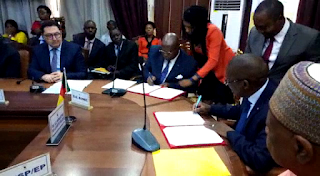Agbor Balla Spits Fire At Canadian House Of Commons
BY A Correspondent
The pioneer leader of the Cameroon Anglophone Civil Society Consortium,
CACSC, Barrister Felix Agbor Nkongho, aka Agbor Balla, in a briefing at the
Canadian House of Commons has beckoned the Canadian authorities, to pressure
the Cameroon government and other decision makers, to organise a referendum,
for the people of former Southern Cameroons, to decide their fate.
Addressing Canada’s House of Commons’ Sub-Committee on International
Human Rights, chaired by Anita Vandenbeld, Agbor Balla briefed the members of
the Committee on Human Rights violations and the evolution of the Anglophone
struggle. He narrated how the crisis started with written petitions by lawyers,
which he said was ignored.
Agbor Balla went on to say that the dissenting opinions then graduated
to peaceful protests which were brutally suppressed, followed by arrest and
imprisonment of leaders which created a power vacuum that was filled by
pro-independence advocates as the moderates advocating for a federal system of
governance were imprisoned.
Responding to questions from members of the Committee, the Human Right
Activist and lawyer told them that “We have a government which really doesn’t
respond. Lawyers had written about four memorandums to the State, documenting
the problems that they face, but unfortunately, no body responded to them.
Nobody even acknowledged receipt of these documents. So they decided to have a
sit-in strike action. For One month, no body responded to them. Then we decided
that we will march in the streets with our wigs and gowns and call the attention
of the government if they were really sleeping, they will realise that we meant
business.
“But the lawyers were brutalised, they were beaten, they were dragged
in the mud, their wigs and gowns were seized. As a result of that, teachers and
students had to join them in protest. These were peaceful protests, but
unfortunately, on the 17 of January, 2017, internet was disconnected in the English-speaking
regions of the Country for three months. That is part of the collective
punishment. We have had war in the North on Boko Haram which is going on and at
no point in time, was internet cut off there, but because of protest in English
speaking Cameroon, internet was cut off for three months.
We were arrested, blind folded and cuffed. They drove us for over 10
hours, locked up in dehumanising conditions and charged us in front of a
military tribunal. So during this period, when they had taken out the moderate
leaders, the movement moved into the hands other groupings which had been
existing, but did not have the voice. So now a platform had been created and
the young people in Anglophone Cameroon who wanted change had created that
platform which we were just fortunate to be their leaders and because of the
treatment that they had given to those who were clamouring just for federation
and better living conditions, and reforms in legal and educational systems.
“Most people argued that if you, who were preaching federation are
facing a death penalty, I will rather preach cessation and separation and
equally face the death penalty. So that is how positions hardened, because of
the way people were killed and others arrested, and now we have a separatist
movement.”
He went on to tell the Canadian House of Commons that “If you talk to
the average person in Anglophone Cameroon, separation is now en vogue. Now the
majority of the people would not settle for anything less than separation. The
majority of the people now are asking for referendum for them to determine
their fate.”
Agbor Balla in his submission lobbied for Canadian authorities to also
put in pressure in order for a lasting solution to be brought to the crisis
that keeps degenerating.





Comments
Post a Comment